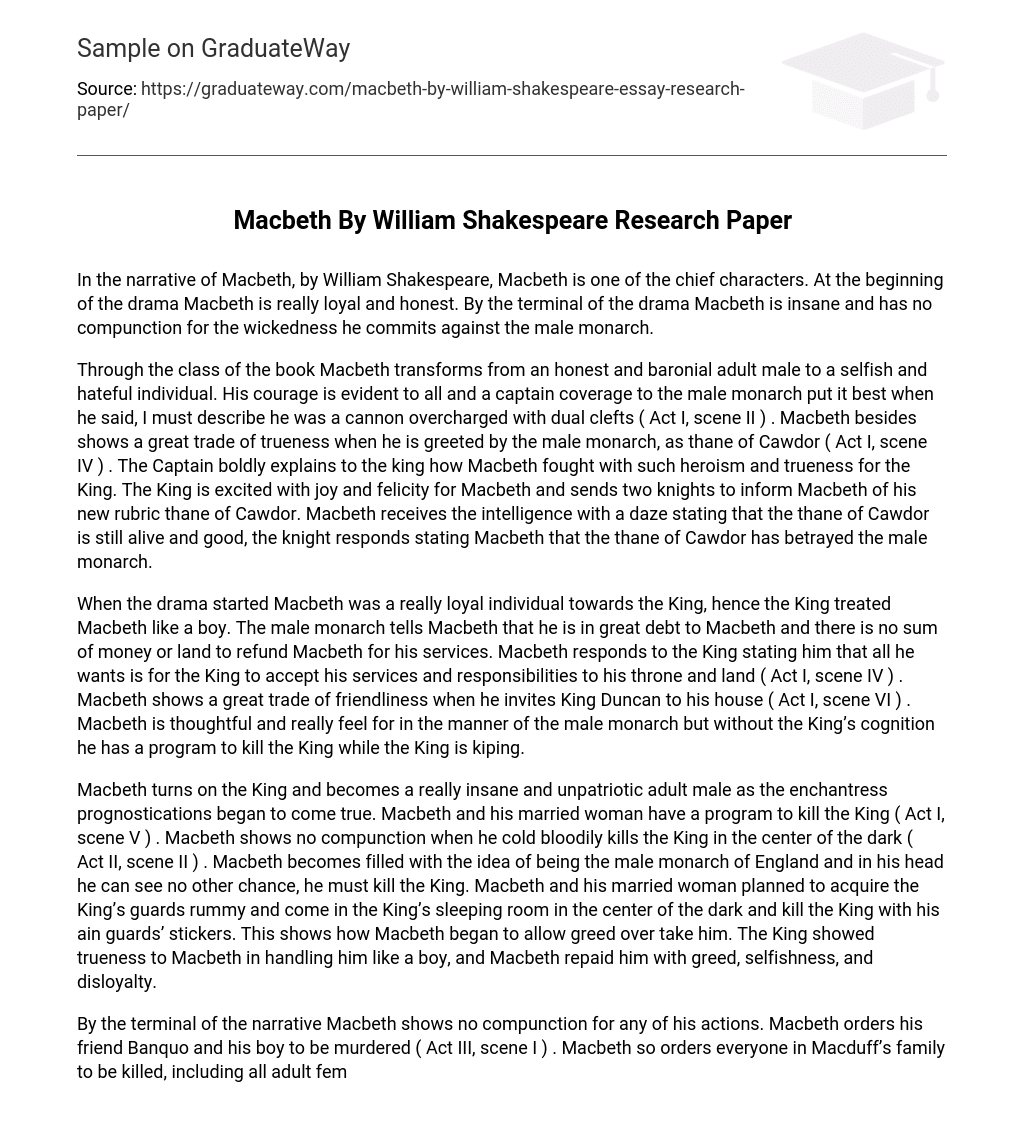In the narrative of Macbeth, by William Shakespeare, Macbeth is one of the chief characters. At the beginning of the drama Macbeth is really loyal and honest. By the terminal of the drama Macbeth is insane and has no compunction for the wickedness he commits against the male monarch.
Through the class of the book Macbeth transforms from an honest and baronial adult male to a selfish and hateful individual. His courage is evident to all and a captain coverage to the male monarch put it best when he said, I must describe he was a cannon overcharged with dual clefts ( Act I, scene II ) . Macbeth besides shows a great trade of trueness when he is greeted by the male monarch, as thane of Cawdor ( Act I, scene IV ) . The Captain boldly explains to the king how Macbeth fought with such heroism and trueness for the King. The King is excited with joy and felicity for Macbeth and sends two knights to inform Macbeth of his new rubric thane of Cawdor. Macbeth receives the intelligence with a daze stating that the thane of Cawdor is still alive and good, the knight responds stating Macbeth that the thane of Cawdor has betrayed the male monarch.
When the drama started Macbeth was a really loyal individual towards the King, hence the King treated Macbeth like a boy. The male monarch tells Macbeth that he is in great debt to Macbeth and there is no sum of money or land to refund Macbeth for his services. Macbeth responds to the King stating him that all he wants is for the King to accept his services and responsibilities to his throne and land ( Act I, scene IV ) . Macbeth shows a great trade of friendliness when he invites King Duncan to his house ( Act I, scene VI ) . Macbeth is thoughtful and really feel for in the manner of the male monarch but without the King’s cognition he has a program to kill the King while the King is kiping.
Macbeth turns on the King and becomes a really insane and unpatriotic adult male as the enchantress prognostications began to come true. Macbeth and his married woman have a program to kill the King ( Act I, scene V ) . Macbeth shows no compunction when he cold bloodily kills the King in the center of the dark ( Act II, scene II ) . Macbeth becomes filled with the idea of being the male monarch of England and in his head he can see no other chance, he must kill the King. Macbeth and his married woman planned to acquire the King’s guards rummy and come in the King’s sleeping room in the center of the dark and kill the King with his ain guards’ stickers. This shows how Macbeth began to allow greed over take him. The King showed trueness to Macbeth in handling him like a boy, and Macbeth repaid him with greed, selfishness, and disloyalty.
By the terminal of the narrative Macbeth shows no compunction for any of his actions. Macbeth orders his friend Banquo and his boy to be murdered ( Act III, scene I ) . Macbeth so orders everyone in Macduff’s family to be killed, including all adult females and kids ( Act IV, scene II ) . This shows how far Macbeth has sunk into his insanity. Macbeth kills without experiencing. Macbeth was one time a friend to these people, now to protect himself and further his greed he kills friends, demoing no compunction in his actions.
Macbeth was one time a adult male of honored character, he was a adult male of great trueness; a adult male of great courage. Macbeth was treated as an equal in the King’s place, treated like a boy. But shortly the flicker of greed would be ignited with the prognostications of the enchantress. Macbeth’s greed grew and consumed his ideas. Macbeth even drew his married woman into his greed. Together they fanned the fires that would began to distribute into insanity, where nil could halt Macbeth from his fate.





